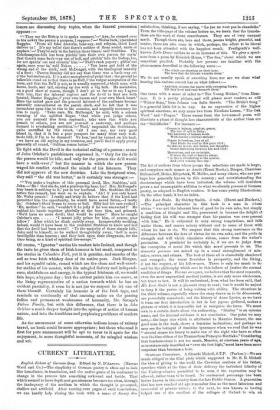CURRENT LITERATURE.
English Echoes of German Song. Edited by N. D'Anvers. (Marcus Ward and Co.)—The simplicity of German poetry is often apt to look like homeliness, in translation, and the native grace of its sentiment to change in the process into something awkward and feeble. That which seemed to have depth and genuineness becomes too often, through the inadequacy of the medium in which the thought is presented, shallow and artificial. After turning over pages of such translations, we can hardly help closing the book with a sense of dreary dis- satisfaction, thinking, if not saying, "La jen no vaut pas la chandelle." From the title-page of the volume before us, we learn that the transla- tions are the work of three contributors. They are of very unequal merit. Though there are, here and there, poems bright, graceful, and tender, there are also some in which, perhaps, the effort to be literal has not been attended with the happiest result. Freiligrath's well- known Liebe Dauer strikes us as an instance of this. We give a speci- men from a poem by Heinrich Heine, "The Sea," about which we are somewhat puzzled. Probably few persons are familiar with the phenomenon described in the following verse :— "The winds are drawing on their hose, The hose that the billows wreathe them."
We do not usually speak of wreathing hose, nor are we clear what bearing this curious conceit has on what follows :—
0 And they scourge the waves with sweeping blows, Till they howl and rush beneath them."
One turns with a sense of relief to "The Young Mother," from Ham- mer. It is a pretty picture, and will please most readers, as will "Winter Song," from Johann von Salle &amis. "The Bride's Song" is a graceful little bit in its way. As an expression of the higher spiritual emotions, we may name two from Nicolans Lenart, "The Oak Wood" and "Prayer." Three verses from the last-named poem will illustrate a phase of thought less characteristic of the author than are the " Schilflioder." For instance :— " Prayer is balsam, comfort, peace, The loss of self in Deity ;
The harmony of human souls With heaven's eternal melody: Prayer Is freedom, loss of all That binds the soul to this poor clod ; So that no words, nor forms, nor thoughts Stand darkening between her and God:
Mysterious, and yet so bright,
It bears the soul to heaven away; is like a slumbering at the source, And yet a waking into day."
The list of authors from whose poems the selections are made is large, and comprises such names as Arndt (Ernst Moritz), Burger, Chemise° Eichendorff, Heine, Klopstook, W. Muller, and many others, who are per- haps less generally known in this country ; and notwithstanding the shortcomings which have been indicated, the volume will doubtless prove a not unacceptable addition to what we already possess of German poetry, as adapted to English readers. It has some pretty illustrations. On the other hand, it has no index.






























 Previous page
Previous page